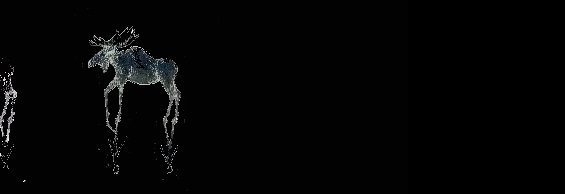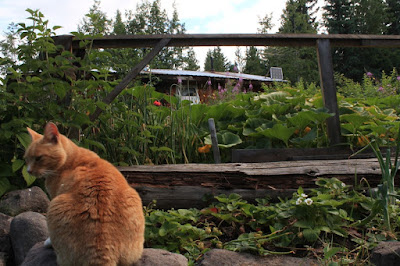It almost feels like sun worship. Watching our garden grow, working,
feeding our electricity habit and staying healthy by the sun.
We live a low energy lifestyle and work in an isolated spot in
the interior of British Columbia. Getting away from the geopolitical mess or at least putting a bit of head space from the mess of corruption and manipulation.
We started with two 85 watt panels and
two golf cart batteries 25 years ago. Powered our 12 volt tv and a
light. Now we run 3 small, independant solar arrays.
The smallest is made up of a 75 watt panel fixed to our roof, facing south connected to a charge controller. The controller is connected to one 12 volt deep cycle battery. It powers a 12 volt light in the pantry, a 12 volt water pump from our well, a cd, tape player and radio.
A second system is made up of 4 panels (400 watts) mounted on a sun tracker 5 metres high that we built for less than $50. The panels are connected to a 40 amp controller that is connected to 4 x 6 volt deep cycle lead acid batteries. The batteries are connected to a 1750 watt inverter. The system is 20 years old. Two of the panels are 25 years old. The system runs electricity into our cabin and shop. It cost us $5000.
 |
| 500 watts of solar panel |
Sun trackers can provide a 45% increase in power.
We built this one 20 years ago. It has been modified since then to hold 4 panels vertically.
We
live and work here. The trackers are manual. We turn them directly on
the sun three or four times a day in the summer. Spring and fall, 2 or 3
times. In the winter they are static. Working with the sun. On dark
winter days we run a 3000 watt inverter generator for a few hours,
assuring everything stays rock hard in the freezer.
Besides lights, computers and the odd kitchen appliance, we power our shop. Our most demanding machine is the band saw with a 3/4 horse power motor.
What we have learned to get the most from your solar panels is:
charging batteries and relying on that stored power is not the way to go. Battery technology is inefficient. For us stored power is just enough for lights and computers when there is no sun. When the sun is out we'll work. From March until October we have unlimited power for our needs. We work full time with smaller machines (10 amps and less) when the sun is out. The bigger machines we use intermittently and because of our lighter wiring we run one 3/4 horse machine at a time.When the batteries are charged and there is a 60% sun day the process is a lot more efficient. Solar energy flows through the panels. The batteries act like a conduit. Energy the inefficient batteries will not accept on a full sun day is the energy we can use up.
After working in the shop,
at the end of a day the batteries have as much charge as they had at the
beginning of the day. If the day involved lots of heavy use, like using
the table saw ripping or milling apple wood with the band saw etc, all
over 15 amps, then we would alternate system. Keeping the batteries
charged.
 |
| Our shops |
This
power set up could be doubled, tripled, quadrupled... You would just
need more. Heavier wiring, more wattage (panels), larger capacity
controllers etc....
We help charge the batteries with a generator in the low sun months from November until the middle of February. We need to use a generator for machine power in the winter and on heavy load days in the early spring and fall. We slow our work right down in the winter. It works out.
Having two main systems that are interchangeable has proven to be a great asset in the low sun months. As one system is being used and discharges the other is charging.
4.6 billion years old. The sun will start a transformation into a red dwarf in 5 billion years. Swallowing the earth, Mars...
Consider, the sun provides enough power in one hour than the planet of people use in one year.
We are fortunate to live and work with the sun. A few panels and batteries have worked for us. What we've paid for our 1000 watt systems, today, you could buy 6 or 7 times as much power. A system of 5 or 6 thousand watts would pay for itself in 2 or 3 years if not sooner.
It
almost feels like sun worship. Watching our garden grow, working,
feeding our electricity habit and staying healthy by the sun. That is
the point. The sun. The most eye opening idea we've seen is the fact that the sun will supply everything human kind needs and more, it's staggering how much more,
Regards,
Aki and Scott




















 The frost arrived at the beginning of Sept so we fed them open trays of sugar syrup until they stopped taking it near the middle of October so they could build up their winter stores.
The frost arrived at the beginning of Sept so we fed them open trays of sugar syrup until they stopped taking it near the middle of October so they could build up their winter stores. 

 After a couple of weeks of this most get comfortable and may only move half a dozen yards for the rest of their lives. After nine or ten weeks slaughter them and fill yo
After a couple of weeks of this most get comfortable and may only move half a dozen yards for the rest of their lives. After nine or ten weeks slaughter them and fill yo

 Ten weeks go by. We slaughter all the Cornish Giants and fill our freezer with chicken.
Ten weeks go by. We slaughter all the Cornish Giants and fill our freezer with chicken.























